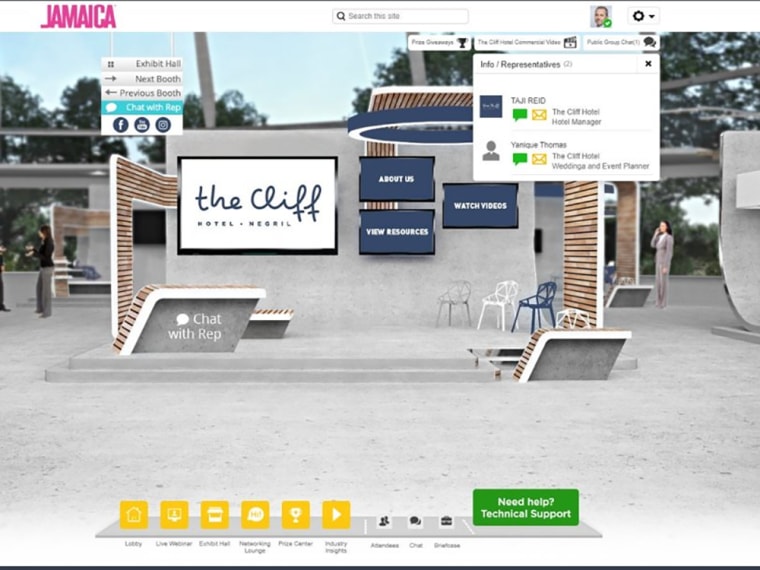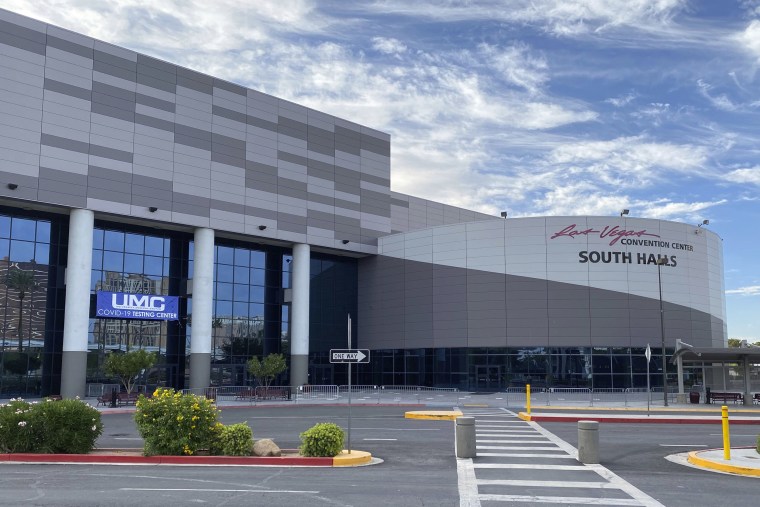Small signs of optimism are returning to the $100 billion convention industry.
After two months of declines, more convention and meeting planners now say they’re starting to source and book future events, according to a survey by Northstar Meeting Group. As of mid-May, just one-third of respondents were signing contracts for new events. That’s now risen to 40 percent, returning to April levels.
“Meeting planners have gotten a little more hopeful about meetings coming back,” said Loren Edelstein, Vice President of Northstar Meetings Group, a meetings and conventions marketing and information firm based in Secaucus, New Jersey.
“The sentiment was way down and then in the last two weeks there’s been a little bit more optimism,” as some states have slowly started reopening plans. But progress will be slow and on a case-by-case basis. “There will be a phase-in period,” Edelstein told NBC News.
Hosting a convention can bring millions of dollars for local businesses and is a priceless marketing boost for the city. But coronavirus health risks and social distancing guidelines have forced some state governors to enact safety measures that have virtually killed the business model for large, in-person gatherings in the near term.
Some big brands have canceled their conventions, moved them online, or had to dramatically overhaul their plans, sometimes at the last minute.
Last week, the majority of the Republican National Convention was moved from Charlotte, North Carolina, to Jacksonville, Florida, after the Republican National Committee found itself at loggerheads with North Carolina Gov. Roy Cooper, a Democrat, who was reluctant to ease COVID-19 restrictions. The convention is scheduled for the week of Aug. 24; Trump will accept the Republican presidential nomination at VyStar Veterans Memorial Arena.
There is still a plan to hold all convention business in Charlotte because of contractual obligations between the city and the RNC.
Other big meetings are still proceeding, after implementing new health and safety strategies. After losing $738 million from canceled events, Florida's Orange County Convention Center will in July hold its first conference since the shutdown, with 10,000 guests. In Grapevine, Texas, the Sun Belt Builders show will host over 2,000 next month. Las Vegas is betting on a return of group business by August, according to the city's tourist board.
Some meetings are proceeding in a highly modified way. The Voice of Healthcare summit is planned to be held in early August with limited capacity at an open air winery outside Boston. Participants must pass a rapid COVID test at the door. Those who pass will be allowed to enter and move about without any other restrictions or requirements. Those who fail the test will be denied entry.
Other trends are more prevalent in the meeting industry for any in-person event. Hand sanitizers will be placed everywhere. Tables that would seat eight people can now only seat two. Meetings held in auditoriums have every other other row blocked off. Room size has to increase to allow for social distancing if the attendance levels are the same. Locations are being chosen outside traditionally popular dense urban areas. A growing number of organizers are planning to do temperature checks at the door.

Others have gone all digital. Apple’s annual developer conference next week will be online only this year. The American Society for Radiation Oncology will hold its annual conference inside a virtual exhibit hall rendered to look like the Miami Convention Center, its original location, via a web-based platform that includes booths and a chatroom populated by company reps. And what convention, in the physical or virtual world, would be complete without prize giveaways?
Demand for workers who can organize these types of gatherings are one the rise. Since the beginning of March, job postings for virtual event planners have tripled, according to data from employment site ZipRecruiter.
While nothing can replace the feeling of an in-person connection, online conventions have their pluses. Overhead costs for organizers are minimal, attendees and exhibitors pay reduced rates, and it's usually easier to get a speaker — who only has to spend an hour of their day, instead of potentially several days of traveling.
Some online events have even reported triple the number of attendees for their rescheduled online event, compared to registrants for the original physical event, as it’s easier for more people to attend from home. Businesses and employees are hungry for industry information and contacts during an uncertain and recessionary outlook.
But digital events can’t replace the income for local businesses in cities who have lost a convention.
“Charlotte needs the business,” said Noah Lazes, president of Ark Group, a developer who converted a former industrial mill site on the north side of town into a multi-use facility with two concert venues, several restaurants and bars, and office and retail space. “Our downtown is suffering the worst. All the big office buildings are completely vacant, and the suburbs are making better recoveries.”
When Charlotte hosted the Democratic National Convention in 2012, it had an economic impact of over $160 million in both direct spending and in tourism boosts, according to an outside study commissioned by the mayor’s office. By the RNC’s own estimates, the convention this summer would have resulted in $100 million to $200 million in tourism spending.
Tech publisher O’Reilly, which built a huge business around in-person conferences, announced in March that it was ending that part of the business permanently and switching to all-digital events.
“Without understanding when this global health emergency may come to an end, we can’t plan for or execute on a business that will be forever changed as a result of this crisis,” O’Reilly President Laura Baldwin wrote in a blog post.
Last Friday, the Centers for Disease Control and Prevention released new guidelines for events and gatherings. Cloth face coverings are strongly encouraged "in settings where individuals might raise their voice (e.g., shouting, chanting, singing),” the guidelines state.
The recommendations also include increased ventilation, modified seating to allow for social distancing, limiting bathrooms to one at a time, ample supplies of hand sanitizer, and posting signs discouraging attendees from shaking hands or other types of physical contact.
Diane Goodman, founder of Goodman Speakers, which provides speakers and entertainers for events, usually attends several conferences a year. Since March, she has attended only virtual conferences.
While she says she will return to live events, she will be more selective, and consider the organizer and venue's safety precautions as a factor.
She told NBC News she misses the face-to-face time and the chance encounters that can happen when you go get a cup of coffee or walk around a convention space.
"We're social creatures. That's how you really build relationships with prospective clients, which you just can't do over a Zoom call," Goodman said.

